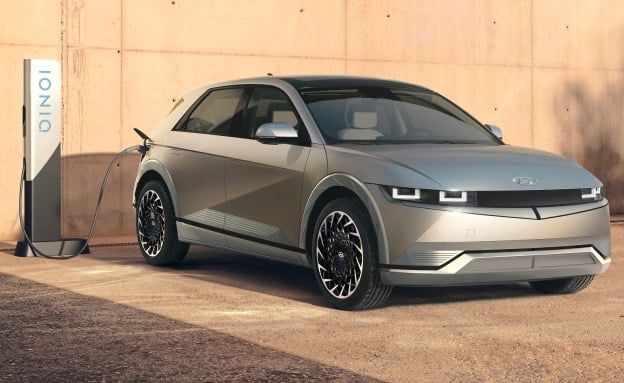A row of global automakers declares battery independence
Toyota focuses on developing all-solid-state batteries
Yesterday’s customer became today’s competitor…

Hyundai Motor Company’s electric vehicle Ioniq 5. / Provided by Hyundai Motor Company
The shock of the world’s largest automaker Volkswagen’s’declaration of independence for batteries’ is spreading. It was confirmed that the Hyundai Motor Group is also pursuing its own battery production plan.
Other automakers, such as Toyota, GM, Ford, etc., will soon start internalizing batteries, analysts say. There has been an emergency in the domestic battery industry, such as LG Energy Solution, Samsung SDI, and SK Innovation.
Automaker “Survival when battery is self-sufficient”
According to the industry on the 20th, Hyundai Motor Group is internally reviewing plans to vertically integrate key parts such as electric vehicle batteries. It is known that when Volkswagen announced on the 15th (local time) to expand its own battery production at’Power Day’, a high-level order to prepare a countermeasure has fallen.
The Hyundai Motor Group recently expanded and reinforced the battery R&D organization for electric vehicles in the battery development room of the Namyang Research Center into three areas: prior technology, production technology, and battery technology. The goal is to research a system optimized for the company’s electric vehicles and to develop a’all-solid-state battery’ that uses solids instead of liquids for electrolytes. Research personnel were also greatly reinforced.
It is analyzed that Hyundai Motor’s movement to internalize batteries was a scheduled procedure. This is because Hyundai Motor, which is competing with Volkswagen in the global market, must lower battery prices in the mid- to long-term in order to take the lead in the market.
Currently, batteries account for about 30-40% of the total production cost of electric vehicles. Volkswagen predicted that if the battery manufacturing cost reduction was achieved as scheduled, the selling price of electric vehicles could be reduced by more than 5%.
An official in the battery industry said, “The electric vehicle battery corresponds to the engine of an internal combustion locomotive.” “It was an open secret that finished car makers are investing in battery manufacturing technology, but Volkswagen’s announcement faster than expected shocked the industry,” he added.
To date, Tesla and Volkswagen have officially announced that they will produce their own batteries. Tesla was a German battery company last year ATWIt acquired Automotive and started producing its own battery. Elon Musk, Tesla Chief Executive Officer (CEO) Said at’Battery Day’ in September last year, “We will implement the battery production plan within 3-4 years.” Toyota of Japan is also focusing on developing all-solid-state batteries.
Some analyzes say that the’battery lawsuit’ held by LG Energy Solution and SK Innovation in the United States has accelerated plans for internalization of batteries by automakers.
This is because a major disruption occurred in Volkswagen Ford’s EV production plan, which had signed a battery contract when SK lost. It is explained that this incident has helped automakers reduce the need for securing their own battery production lines.

Photo = AP
“It will take 5-6 years to internalize the battery”
The feeling of crisis in the domestic battery industry is considerable. After Volkswagen declared battery independence on the 16th, the stock prices of three battery companies, including LG Chem (-14.1%), SK Innovation (-7.4%), and Samsung SDI (3.6%), fell at the same time.
However, it is difficult to point out that the market’s concerns are excessive. Automakers have been struggling to develop batteries, but they are still LGChemistry or SKCompared to technological prowess such as innovation, analysis is at the initial stage.
A senior official at LG Energy Solutions said, “It took more than 20 years for LG to become globally competitive in the battery market. Like memory semiconductors, there is a considerable technology gap between leading and latecomers.”
He added, “Even now, late-stage battery makers are having difficulty securing yield. Even if finished car makers succeed in internalizing batteries, 100% self-production will not be possible.”
The risk of automakers pursuing internalization of batteries is also the fact that they have to make huge investments without competing with various battery companies to lower their prices, and that if the current trend of lithium-ion battery technology evolves into all-solid batteries, etc. It is counted as an element.

Photo = Reuters
In fact, Volkswagen’s rival, BMW, recently announced that it has no plans to produce its own battery for electric vehicles. BMW CEO Oliver Rent on the 19th said, “We have signed various purchase contracts with battery companies in Korea, China and Europe. These companies will supply sufficient batteries to keep pace with BMW’s expansion of electric vehicle production in the next few years.”
“Even if finished car makers start internalizing batteries from now, it will take at least 5 to 6 years,” said Pilsoo Kim, professor of the Department of Future Vehicles at Daelim University. The company’s nervous warfare will continue,” he said.
Reporter Mansoo Choi [email protected]
